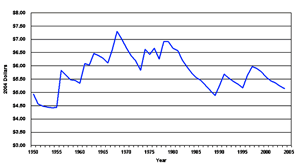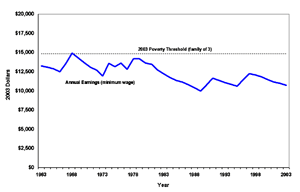It will be hard to find a Capitol Hill vote any more shameful than this one. . . .
Senate Republicans killed a move to increase the miserably low minimum wage this past week. An amendment to increase the minimum wage by $1.10 per hour to a total of $6.25 per hour — offered by Senator Ted Kennedy (D-MA) — was shot down by a 47 Yes-51 No vote on October 19th. The amendment was a watered-down version of an earlier increase proposal by Kennedy that would have upped the minimum wage over two years to $7.25 per hour. The vote was largely a party-line affair, with four Republicans supporting the amendment along with one Independent, and two Democrats failing to vote at all. Check how your lawmaker voted: visit http://thomas.loc.gov/; go to Roll Call Votes; then to the Senate, 109th Congress (2005-06), 1st Session; then to vote number 257.
Research conducted in 2003 indicated that no fewer than 40 Senate members were millionaires, with 22 Republicans and 18 Democrats reaching this elite milestone. And even those who failed to make the millionaire mark were well on their way, with annual Senate salaries now at $162,100.
Senators have given themselves eight pay increases since 1997, the last time the minimum wage was increased. The Senate pay increases over the past eight years alone are more than three times the total annual wage of $10,700 earned by a worker who labors full-time for the $5.15 minimum wage. Federal, state, and local governments also subtract various withholding taxes from the paychecks of minimum wage earners, further impoverishing these hard-working people. The Economic Policy Institute (EPI) — a pro-worker think tank — maintains an important archive of facts and analysis regarding the minimum wage issue: visit http://www.epinet.org/ and, under “ISSUE GUIDES,” click on “minimum wage.”
And, just in case you thought that this saga couldn’t possibly be any more outrageous, during the battle Republican Senator Michael B. Enzi from Wyoming offered an 87-page bill that would have also increased the minimum wage by $1.10 per hour. The bogus Enzi proposal came with a few catches, however: the Enzi bill increasing the minimum wage would have eliminated overtime pay for millions of workers, stopped states from increasing the minimum wage on their own, and provided legal immunity for companies in a whole range of consumer lawsuit situations, among other things. The Enzi scheme thankfully failed by a 42 Yes-57 No vote.
It is now approximately one year until the 2006 Congressional elections. . . .
Chris Townsend is the Political Action Director of the United Electrical Workers Union (UE).


